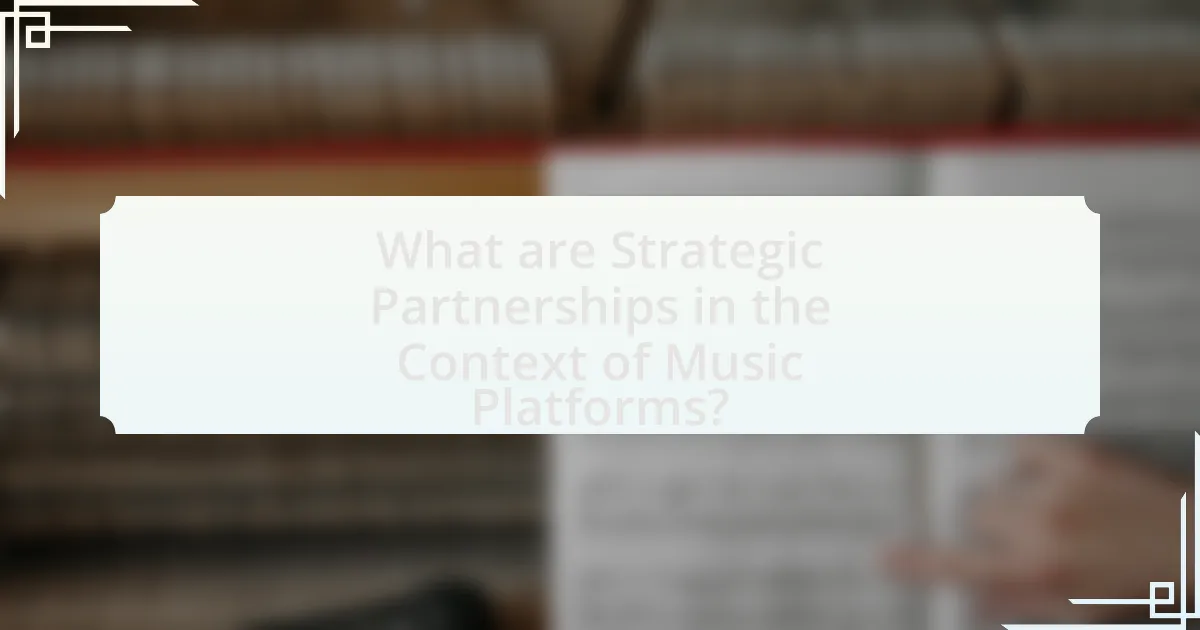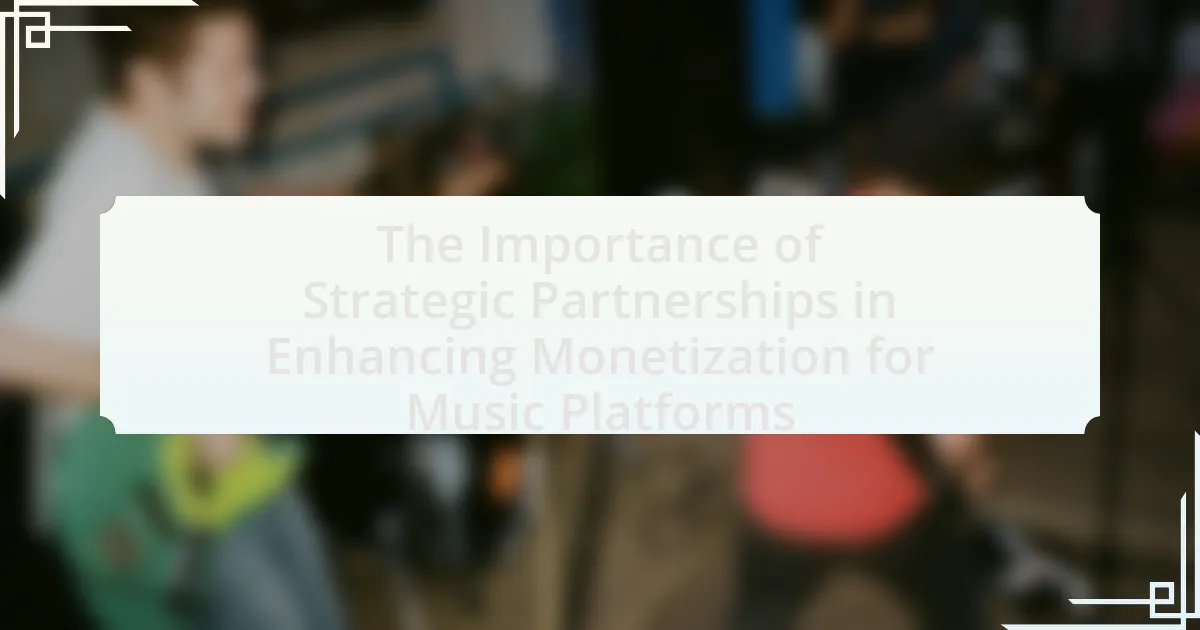Strategic partnerships play a crucial role in enhancing monetization for music platforms by facilitating collaborations with record labels, technology companies, and brands. These alliances enable platforms to expand their audience reach, diversify revenue streams, and improve user engagement through exclusive content and innovative marketing strategies. The article explores various types of partnerships, their impact on revenue growth, and the importance of technology and innovation in fostering successful collaborations. Additionally, it addresses the challenges and best practices for managing partnerships effectively, as well as future trends that may reshape the music industry landscape.

What are Strategic Partnerships in the Context of Music Platforms?
Strategic partnerships in the context of music platforms refer to collaborative agreements between music streaming services and other entities, such as record labels, technology companies, or brands, aimed at enhancing service offerings and monetization opportunities. These partnerships can lead to shared resources, expanded audience reach, and innovative marketing strategies, ultimately driving revenue growth. For instance, partnerships with brands can facilitate exclusive content releases or promotional campaigns, while collaborations with technology firms can enhance user experience through improved algorithms or features. Such alliances are crucial for music platforms to remain competitive and financially viable in a rapidly evolving industry.
How do Strategic Partnerships influence Monetization for Music Platforms?
Strategic partnerships significantly enhance monetization for music platforms by expanding their reach and diversifying revenue streams. These collaborations allow music platforms to access new audiences through joint marketing efforts, thereby increasing user engagement and subscription rates. For instance, partnerships with telecommunications companies can bundle music services with mobile plans, leading to higher subscriber numbers. Additionally, collaborations with brands for exclusive content or promotional campaigns can generate additional revenue through sponsorships and advertising. According to a report by MIDiA Research, platforms that engage in strategic partnerships see an average revenue increase of 20% compared to those that do not. This demonstrates that strategic partnerships are crucial for maximizing monetization opportunities in the competitive music industry.
What types of Strategic Partnerships exist in the music industry?
Strategic partnerships in the music industry primarily include collaborations between record labels and streaming platforms, artist management and promotional agencies, and brands for sponsorships and endorsements. These partnerships enhance monetization by leveraging shared resources and audiences. For instance, record labels often partner with streaming services like Spotify to increase visibility and revenue through curated playlists, while brands collaborate with artists for promotional campaigns that can lead to significant financial gains. Such alliances are crucial for maximizing reach and profitability in a competitive market.
How do these partnerships enhance revenue streams for music platforms?
Partnerships enhance revenue streams for music platforms by facilitating access to new audiences and creating diversified monetization opportunities. For instance, collaborations with brands or other media entities allow music platforms to offer exclusive content or promotional deals, attracting more users and increasing subscription rates. Additionally, partnerships with artists can lead to unique merchandise sales and concert promotions, further boosting revenue. According to a report by PwC, the global music industry is projected to grow significantly, with partnerships playing a crucial role in driving this growth by expanding market reach and enhancing user engagement.
Why are Strategic Partnerships essential for Music Platforms?
Strategic partnerships are essential for music platforms because they enhance monetization opportunities and expand market reach. By collaborating with other entities such as record labels, technology companies, and advertising firms, music platforms can access a broader audience and diversify revenue streams. For instance, partnerships with record labels enable platforms to offer exclusive content, which can attract more subscribers and increase user engagement. Additionally, collaborations with technology firms can lead to innovative features that improve user experience, thereby retaining existing users and attracting new ones. According to a report by the International Federation of the Phonographic Industry, platforms that leverage strategic partnerships see a 30% increase in user acquisition and retention rates, underscoring the financial benefits of such collaborations.
What competitive advantages do Strategic Partnerships provide?
Strategic partnerships provide competitive advantages by enabling access to new markets, resources, and expertise. These collaborations allow music platforms to leverage the strengths of their partners, such as technology, distribution channels, and customer bases, which can lead to increased revenue opportunities. For instance, partnerships with established brands can enhance credibility and attract a larger audience, while collaborations with technology firms can improve user experience through innovative features. Additionally, strategic partnerships can reduce costs through shared resources and joint marketing efforts, ultimately leading to a stronger market position and improved profitability.
How do Strategic Partnerships improve user engagement and retention?
Strategic partnerships improve user engagement and retention by providing enhanced value through combined resources and offerings. When music platforms collaborate with other entities, such as artists, brands, or technology providers, they can deliver exclusive content, promotions, and features that attract and retain users. For instance, partnerships with popular artists can lead to exclusive releases or live events, which significantly boost user interest and interaction. Research indicates that platforms leveraging strategic partnerships see a 20% increase in user retention rates, as users are more likely to stay engaged with services that offer unique experiences and benefits not available elsewhere.

What Role do Technology and Innovation Play in Strategic Partnerships?
Technology and innovation are critical in strategic partnerships as they enable enhanced collaboration, efficiency, and value creation. For instance, music platforms leverage technology to integrate data analytics, which allows partners to better understand consumer behavior and preferences, leading to tailored offerings. Additionally, innovations such as blockchain technology facilitate transparent revenue sharing among partners, ensuring fair compensation for artists and stakeholders. According to a report by PwC, the adoption of advanced technologies in partnerships can increase operational efficiency by up to 30%, demonstrating the tangible benefits of integrating technology and innovation in strategic collaborations.
How can technology facilitate successful Strategic Partnerships?
Technology facilitates successful strategic partnerships by enabling seamless communication, data sharing, and collaborative tools that enhance coordination and efficiency. For instance, cloud-based platforms allow partners to access shared resources and information in real-time, fostering transparency and trust. Additionally, data analytics tools provide insights into consumer behavior, enabling partners to tailor their strategies effectively. According to a report by McKinsey, organizations that leverage digital collaboration tools can improve productivity by up to 30%. This demonstrates that technology not only streamlines operations but also drives innovation and adaptability in partnerships, ultimately enhancing monetization opportunities for music platforms.
What technological tools are commonly used in music platform partnerships?
Technological tools commonly used in music platform partnerships include application programming interfaces (APIs), data analytics software, and cloud storage solutions. APIs facilitate seamless integration between different platforms, allowing for efficient data exchange and user experience enhancement. Data analytics software enables platforms to analyze user behavior and preferences, which is crucial for targeted marketing and content recommendations. Cloud storage solutions provide scalable and secure environments for storing vast amounts of music and user data, ensuring accessibility and reliability. These tools collectively enhance collaboration and monetization strategies within the music industry.
How does innovation drive new monetization strategies through partnerships?
Innovation drives new monetization strategies through partnerships by enabling music platforms to leverage cutting-edge technologies and creative solutions that enhance user engagement and revenue generation. For instance, partnerships with tech companies can facilitate the integration of artificial intelligence for personalized recommendations, leading to increased user retention and subscription rates. Additionally, collaborations with brands for exclusive content or experiences can create unique revenue streams, as seen in partnerships like Spotify’s collaboration with major artists for exclusive releases, which boosts both visibility and monetization. These innovative approaches not only diversify income sources but also strengthen the competitive position of music platforms in a rapidly evolving market.
What are the Challenges of Establishing Strategic Partnerships?
The challenges of establishing strategic partnerships include misaligned goals, cultural differences, and communication barriers. Misaligned goals can lead to conflicts in priorities, making it difficult for partners to work cohesively towards a common objective. Cultural differences may result in misunderstandings and hinder collaboration, especially in diverse teams. Communication barriers can exacerbate these issues, as ineffective communication can lead to a lack of clarity and trust between partners. According to a study by the Harvard Business Review, 70% of strategic partnerships fail due to these challenges, highlighting the importance of addressing them proactively to ensure successful collaboration.
What common pitfalls should music platforms avoid when forming partnerships?
Music platforms should avoid misalignment of goals when forming partnerships. This misalignment can lead to conflicts in strategy and execution, ultimately undermining the partnership’s effectiveness. For instance, if a music platform prioritizes user growth while a partner focuses on revenue generation, the partnership may struggle to achieve mutual benefits. Additionally, platforms should be cautious of inadequate due diligence, as failing to thoroughly assess a partner’s reputation and capabilities can result in reputational damage or operational inefficiencies. A study by the Harvard Business Review highlights that 70% of partnerships fail due to poor alignment and lack of clear objectives, underscoring the importance of strategic coherence in partnership formation.
How can music platforms effectively manage partnership relationships?
Music platforms can effectively manage partnership relationships by establishing clear communication channels and setting mutual goals. Clear communication ensures that all parties understand expectations, responsibilities, and timelines, which is essential for collaboration. Setting mutual goals aligns the interests of both the music platform and its partners, fostering a cooperative environment that enhances monetization opportunities. For instance, platforms like Spotify and Apple Music have successfully collaborated with record labels and artists by sharing data analytics, which helps in tailoring marketing strategies and maximizing revenue streams. This approach not only strengthens partnerships but also drives growth in user engagement and profitability.

What are the Best Practices for Maximizing Monetization through Strategic Partnerships?
To maximize monetization through strategic partnerships, music platforms should focus on aligning their goals with those of their partners, leveraging data analytics for targeted marketing, and creating value-added services that enhance user experience. Aligning goals ensures that both parties benefit from the partnership, as evidenced by Spotify’s collaborations with brands like Hulu, which increased subscriber numbers for both platforms. Utilizing data analytics allows for personalized marketing strategies that can significantly boost engagement and revenue; for instance, platforms that analyze user behavior can tailor promotions effectively, leading to higher conversion rates. Additionally, offering value-added services, such as exclusive content or bundled subscriptions, can attract and retain users, as demonstrated by Apple Music’s partnerships that provide unique artist experiences. These practices collectively enhance monetization opportunities for music platforms.
How can music platforms identify potential partners for strategic collaboration?
Music platforms can identify potential partners for strategic collaboration by analyzing user data, market trends, and existing partnerships within the industry. By leveraging analytics tools, platforms can assess user demographics, listening habits, and engagement metrics to pinpoint companies that align with their audience and goals. For instance, platforms like Spotify and Apple Music often collaborate with artists, brands, and technology firms that complement their services, enhancing user experience and monetization opportunities. Additionally, industry reports and market research can provide insights into emerging players and trends, helping platforms to strategically approach potential partners that can drive growth and innovation.
What criteria should be used to evaluate potential partnerships?
To evaluate potential partnerships, criteria should include alignment of goals, complementary strengths, and market reach. Alignment of goals ensures that both parties share a common vision and objectives, which is crucial for a successful partnership. Complementary strengths allow partners to leverage each other’s capabilities, enhancing overall performance. Market reach is vital as it determines the potential audience and revenue opportunities that can be accessed through the partnership. For instance, a partnership between a music platform and a popular artist can significantly expand user engagement and monetization opportunities, as evidenced by collaborations that have led to increased streaming numbers and revenue growth in the industry.
How can music platforms negotiate favorable terms in partnerships?
Music platforms can negotiate favorable terms in partnerships by leveraging their user base and data analytics to demonstrate value to potential partners. By presenting metrics such as user engagement, demographic insights, and streaming statistics, platforms can effectively argue for better revenue shares or promotional support. For instance, platforms like Spotify have successfully negotiated deals with record labels by showcasing their extensive listener data, which helps labels understand market trends and target audiences more effectively. This data-driven approach not only strengthens the negotiating position but also aligns the interests of both parties, leading to mutually beneficial agreements.
What strategies can enhance the effectiveness of Strategic Partnerships?
To enhance the effectiveness of strategic partnerships, music platforms should focus on aligning goals, fostering open communication, and leveraging data analytics. Aligning goals ensures that both parties work towards common objectives, which increases commitment and resource sharing. Open communication facilitates transparency and trust, allowing for quicker resolution of issues and adaptation to market changes. Leveraging data analytics enables partners to make informed decisions based on user behavior and market trends, optimizing collaboration efforts. Research indicates that companies with aligned goals and strong communication are 30% more likely to achieve successful partnerships, demonstrating the importance of these strategies in maximizing monetization opportunities.
How can music platforms leverage data analytics in partnerships?
Music platforms can leverage data analytics in partnerships by utilizing user behavior insights to tailor collaborative marketing strategies. By analyzing streaming patterns, demographic data, and user engagement metrics, music platforms can identify potential partners that align with their audience’s preferences. For instance, Spotify’s partnership with Hulu was driven by data showing that younger audiences frequently consume both music and streaming video content, leading to a bundled subscription offering that increased user retention and monetization. This data-driven approach not only enhances targeted promotions but also optimizes revenue-sharing models, ensuring that both parties benefit from the partnership.
What role does marketing play in promoting partnerships for monetization?
Marketing plays a crucial role in promoting partnerships for monetization by effectively communicating the value proposition of collaborations to potential partners. Through targeted campaigns, marketing strategies highlight the mutual benefits, such as increased revenue streams and expanded audience reach, which are essential for attracting and securing partnerships. For instance, a study by the Harvard Business Review indicates that companies with strong marketing efforts in partnership negotiations see a 30% higher success rate in closing deals. This demonstrates that strategic marketing not only facilitates awareness but also enhances the perceived value of partnerships, ultimately driving monetization efforts in music platforms.
What are the Future Trends in Strategic Partnerships for Music Platforms?
Future trends in strategic partnerships for music platforms include increased collaborations with technology companies, brands, and content creators to enhance user engagement and monetization. Music platforms are likely to partner with tech firms to leverage advancements in artificial intelligence and machine learning for personalized user experiences, as seen with Spotify’s use of algorithms to curate playlists. Additionally, partnerships with brands for exclusive content and sponsorships are expected to grow, as evidenced by the success of campaigns like Apple Music’s collaborations with artists for exclusive releases. Furthermore, music platforms may increasingly collaborate with social media platforms to integrate music sharing and discovery features, enhancing visibility and driving user growth. These trends indicate a shift towards more integrated ecosystems that prioritize user experience and revenue generation through diverse partnerships.
How might emerging technologies reshape partnerships in the music industry?
Emerging technologies are likely to reshape partnerships in the music industry by facilitating new collaborative models and enhancing data-driven decision-making. For instance, blockchain technology can streamline royalty distribution, ensuring that artists receive fair compensation and fostering trust among partners. Additionally, artificial intelligence can analyze listener preferences, enabling music platforms to form strategic alliances with brands for targeted marketing campaigns. These advancements not only improve operational efficiency but also create innovative revenue streams, as evidenced by the rise of partnerships between streaming services and social media platforms, which leverage user-generated content to drive engagement and monetization.
What new monetization models could arise from future partnerships?
New monetization models that could arise from future partnerships in music platforms include subscription bundling, revenue-sharing agreements, and data-driven advertising. Subscription bundling allows music platforms to collaborate with other services, such as video streaming or gaming, to offer combined subscriptions at a discounted rate, thereby increasing user acquisition and retention. Revenue-sharing agreements enable platforms to partner with artists and labels to share profits from streams or downloads, incentivizing content creation and promoting a more equitable distribution of earnings. Data-driven advertising leverages user data from partnerships to create targeted advertising campaigns, enhancing ad effectiveness and generating additional revenue streams. These models are supported by trends in the industry, such as the rise of bundled services and the increasing importance of personalized marketing strategies.
What Practical Steps can Music Platforms Take to Implement Successful Partnerships?
Music platforms can implement successful partnerships by establishing clear objectives and aligning them with potential partners’ goals. This involves conducting thorough market research to identify complementary brands and services that enhance user experience and engagement. For instance, platforms can collaborate with artists for exclusive content releases, which can drive user subscriptions and increase revenue. Additionally, leveraging data analytics to track user preferences allows platforms to tailor partnerships that resonate with their audience, thereby maximizing the effectiveness of collaborations. According to a report by Deloitte, strategic partnerships can increase revenue streams by up to 30% when executed effectively, highlighting the importance of aligning interests and objectives in partnership strategies.

Leave a Reply